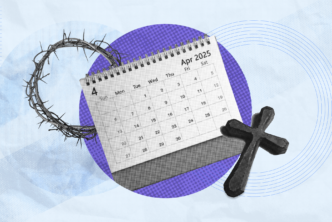Good Friday is observed worldwide by a number of different names: Great and Holy Friday, Friday of Lamentation, High Friday, Passion Friday, as well as Long Friday in Scandinavian countries. But we know it in the West as Good Friday. No matter what you call it, this is the day that the church has commonly recognized and remembered Christ’s crucifixion and death at Calvary.
“It is a very good thing in the Christian life to stand back periodically and look at this great plan. That is why I think it is important to observe Christmas Day and Good Friday and Easter Sunday and to preach on those days. —Martyn Lloyd-Jones
On Good Friday we reflect on God’s plan for our reconciliation. The wonder of Advent became the heartbreaking reality of the nature and penalty of sin on Golgotha. The victory of the resurrection was still to come, and in the interim, those closest to our Lord suffered confusion and despair.
Personally, this is the most reflective day of my year. I find myself vacillating between sorrow for my sin, gratefulness for a Creator so mindful of my condition, and awe at the magnitude of His plan to rescue me.
Here are five suggestions to get the most out of your Good Friday observance:
1. Read the Gospel accounts of Christ’s trial and crucifixion
There are no substitutes for reading the various Gospel narratives to prepare your heart and head for the weight of Christ’s martyrdom and the grandeur of His resurrection!
Whether it is Pilate’s ambivalence, Peter’s denial under pressure, the commuted sentence of Barrabas, or the guilt-ridden betrayal by Judas, I always find something in the Passion story to identify with and challenge myself.
2. Set aside some time for quiet reflection
This one’s significant for me. Every year I schedule a personal retreat. Sometimes it isn’t more than half an hour, but if it’s at all possible I will lay aside a good portion of the day to spend in quiet meditation. This isn’t necessarily prayer time (although it often evolves into prayer)—it is more time to reflect silently.
During this time I might think about the cosmic and personal implications of the crucifixion, my personal guilt and responsibility requiring such extreme measures, and my current alignment with Christ. Am I on the right page? Am I moving in the right direction?
This might sound heavy, but it is always tempered with the understanding that Good Friday is a picture of how deeply and passionately I am cared for by my Creator. My response to this reflective time is always contentment and peace.
3. Find other books and teachings to reflect upon
There are many great resources available that revolve around Christ’s crucifixion. These resources provide an opportunity to jump-start your reflection with thoughts and teachings on the Passion story, as well as its ramifications and significance.
Here is a small handful of the many titles on this theme available from Logos:
Raymond E. Brown Collection, 5 vols. (AYB Reference Library | AYBRL)
Regular price: $119.99
Christian Approaches to Contemporary Thinking Collection (5 vols.)
Regular price: $79.99
4. Attend a Good Friday service
If you are a member of a church that has a Good Friday service, make sure that you attend. One of the beautiful things about the crucifixion is how it has taken us from the isolation of our sinful condition and placed us within a kingdom of faith. There is an important aspect of Good Friday that can only be appreciated in community.
If your church does not have a Good Friday service, that’s okay. I have been blessed many times by attending services at other churches. In fact, some of my most significant Good Friday experiences were with others outside of my denominational circle. There is something transcendent in seeing believers from different backgrounds “celebrate” this holy event that we share.
Even if there isn’t a local church that has a Good Friday service, all is not lost. Gather with some people close to you and put on your own impromptu service where you can share in the Passion story together.
5. Cultivate thankfulness
This might seem like the most trite of the five suggestions, but I think it is the most difficult.
In John 16:33 Jesus tell us, “In the world you will have tribulation, but take courage; I have overcome the world.” (NASB95)
It is easy for all of us to focus on life’s daily little tribulations and let them crowd out our courage and thankfulness. But this is the perfect time of year to realign ourselves with gratefulness. After all, it was in the crucifixion and resurrection that Christ did indeed overcome the world. In light of this, we can have an entirely different perspective on our daily troubles.
No matter how you choose to observe this important day, we hope it is full of profound significance. Take a few moments and share with us your Good Friday traditions.
Related posts
- Good Friday: Sorrow and Hope
- The Death Side of Life: Paul’s Scars and the Meaning of Good Friday
- How Soon After the Resurrection Did Christians Worship Jesus?
- The Resurrection of Jesus and One More Reminder of God’s Glory
- The Triumphal Entry: The Pathway to Glory
Related resources

The Final Days of Jesus: The Most Important Week of the Most Important Person Who Ever Lived
Regular price: $12.99







